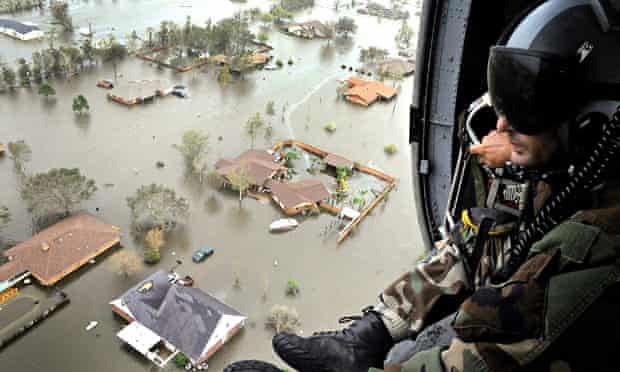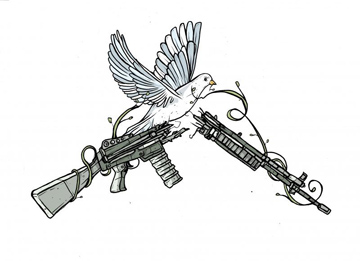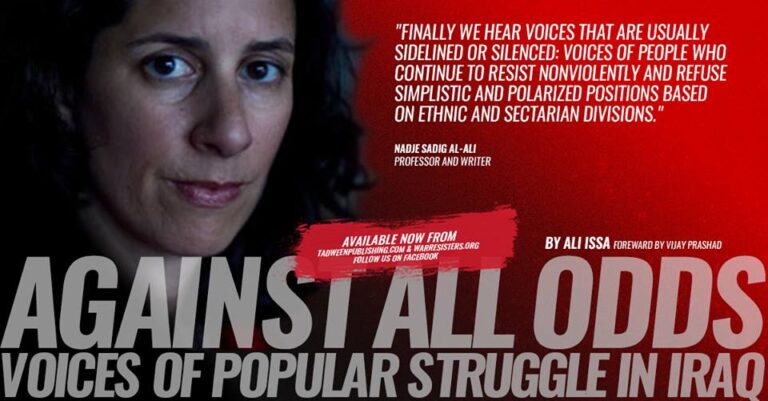A Teach-In on Militarized Disaster Response and Climate Colonialism
A Call to Action on Puerto Rico, International Campaign for Human Rights in the Philippines, and War Resisters League present a teach-in on the impacts of climate change and militarism. RSVP: On Facebook or Email us at wrl [at] warresisters.org
WRL ORGANIZING TEAM STATEMENT ON MILITARISM & CLIMATE CHANGE
As an organization that strives to target and dismantle war at its root causes, we believe in radically different ways of being than what our current world allows. We imagine a world where all people breathe clean air and drink clean water, where all people share what we grow and create, where all people live full, unencumbered lives. Where the land is returned and reparations are paid. When we recognize our reality and the current inheritance of future generations – poisonous wildfires, rising waters, the privatization of every resource we need to stay alive – we gain clarity on our greatest enemies.
The U.S. military does not merely leave in its wake the people it has traumatized, displaced, and murdered. It poisons them for generations with carcinogens and radiation, desertifies their land with pesticides and defoliants, and contaminates their water, aquifers, and soil with jet fuel. Its bases, which occupy invaded lands, consistently rank among the most polluted places globally. The U.S. military is the worst pollutive force in the world, and its leaders and volunteers are footsoldiers to white supremacy, capitalism, and our collective peril. We believe tearing down the war machine is a needed strategy to protecting each other and our relationship with the earth. We believe in an ecosocialist antimilitarism.
We want to celebrate the people we collaborated with on this event, ICHRP and Call to Action on Puerto Rico, for their incredible work challenging U.S. imperialism.
RESOURCES // FORGOTTEN WARS: MILITARIZED DISASTER RELIEF
The Philippines:
TOXIC TRAIL SHADOWS US-PHILIPPINE BASES DEAL by Ted Regencia, Al Jazeera, April 28 2014
- Doctor Gene Nisperos, of the Health Alliance for Democracy in the Philippines, told Al Jazeera that despite the merits of the case, the Philippines “has no power” to hold the US military accountable in court for dumping the toxic waste.
- The report said that “only 25 percent of the five million gallons of sewage generated daily” was treated. Lead and other heavy metals used in ship repair were drained directly into Subic Bay, or buried as landfill – in violation of US standards which require that such heavy metals “be handled and disposed of as hazardous waste”. The report also revealed that during its operation, Subic’s power plant contained “unknown amounts of polychlorinated biphenyl (PCB) and emits untreated pollutants directly into the air”, in conflict with the US’ own clean air standards.
- Devillena, the mother who lost her son to cancer, is unhappy at the return of US troops – and still worries about her family’s health. Since the death of Romar, it took her and her husband Ronald another four years to have a baby, because they were worried about birth defects.Their son Vince Jay is now a healthy 10-year-old. According to Devillena, he is the spitting image of Romar – who would have been 18 in June. In 2007, they had another child, Maria Ceelyn, who is now in first grade. “If you ask me, we don’t really need the US troops,” Devillena said. “We can stand on our own. Not everyone benefited from their presence here before. When they left, we still managed to survive. So I don’t think their return will make a difference.”
- On May 8, the United States and the Philippines kicked off the 33rd iteration of their biggest annual bilateral exercise known as Balikatan, the first one held since Philippine President Rodrigo Duterte took office last June. Balikatan 2017 will last until May 19. As Balikatan 2017 has been playing out, media attention has largely been on the fact that the exercise has been “scaled down” and refocused on fields like humanitarian assistance and disaster relief (HADR) and counterterrorism, with usually more visible live-fire components downplayed.
US REPS, DEL ROSARIO USE TYPHOON HAIYAN TO JUSTIFY INCREASED US MILITARY PRESENCE IN THE PHILIPPINES
- BAYAN-USA found statements made by the government representatives during their joint press conference particularly appalling. Del Rosario stated, “I think this demonstrates the need for this framework agreement we’re working out with the US, because it accentuates the purposes of the framework [one of] which is to make humanitarian assistance and disaster relief and response is a very major aspect of the agreement.” Rep. Smith added, “We know that negotiations are under way. I think, in a paradoxical way, the storm has brought all of us even closer. Every other, economic, [trade] and other ongoing negotiations will be given a positive boost as a direct result of all of these.” Del Rosario and Smith were referring to the Framework Agreement for Increased Rotational Presence and Enhanced Defense Cooperation which the US and Philippines have been negotiating for several months and which would result in the deployment of thousands of additional U.S military personnel to the Philippines and the whole Asia Pacific region.
- “Del Rosario, Smith and Franks are promoting the myth that U.S. militarization of the Philippines benefits Filipinos as much as it benefits U.S. imperial interests. The U.S. Reps may as well say ‘We come in peace’ and serve a turkey dinner as a peace offering while plotting the continued exploitation of the Philippines and the trampling of Philippine sovereignty. This isn’t any different from the European invaders’ genocide and land-theft of Native American peoples centuries ago, which led to the founding of the USA,” stated Ellorin. “Since our governments are not representing the true interests of grassroots people in either country, we have no choice but to continue to raise our voices in opposition, and stand firm in our fight to continue the original Philippine Revolution of 1896 for national democracy and national sovereignty!”
- The implication of this is that military capabilities are vital to the actualization and promotion of HADR (Humanitarian Assistance and Disaster Relief) as a projection of national soft power. In engaging the military and police forces for HADR, hard power finds expression in the soft. Hard power represented by military hardware, especially long distance power projection assets, heavy lift capability, surveillance technologies and loitering capability, can technically constitute a coercive signature. In a soft power mode, these same capabilities, are repositioned benignly in a grand narrative of helping and restoring hope to stricken populations and their governments. In this regard, it is logically possible to both engineer, and fear, this alloy of hard and soft power. Defence and security establishments can reasonably be said to possess dual capability translated into dual signatures in HADR operations. This simple means that competing national interests can find expression in HADR deployments. There is no need to fight a ‘splendid little war’ in Asia to prove one’s military mettle if the political costs are reckoned to be prohibitive. HADR is competition by proxy.
- Disaster relief has also become part of the justification for increased US troop deployments in the Asia-Pacific region—even as the new military basing component of the “Pacific Pivot” has met with strong opposition in Okinawa, Japan and Jeju, South Korea. This massive permanent presence in the Asia-Pacific region has enabled the US military to be the “first and fastest” to respond to sudden calamity.
- The conflation of military power and disaster relief is highly problematic. It is not cost-effective, efficient or transparent. Military operations exhaust limited budgets for humanitarian assistance, rehabilitation and reconstruction activities. Confusion about the military’s role as soldiers or relief providers can lead to suspicion and fear, and some people may not access relief as a result. According to the Department of Defense, the Pacific Command offers not only aid to countries in the region dealing with disasters, but also “forms of advice and assistance, training, satellite imagery or intelligence, surveillance, and reconnaissance support.” More troops on the ground offer greater opportunities for the gathering of intelligence. Revelations that a CIA-funded fake vaccination program in Pakistan was used to find and kill Osama bin Laden provide another example of co-mingling humanitarian relief and military operations, rightly contributing to civilian confusion, public distrust and questions of transparency and accountability.
- There is certainly an urgent need for disaster preparedness, with trained emergency personnel in local communities as well as international teams. The first responders in disasters are families, neighbors, community groups, professional organizations, churches, international humanitarian organizations and governments. Resources should go to these local institutions to strengthen their capacity to respond to disasters and continue the work when emergency teams have all gone home.
Learn more about the work that on-the ground organizers and healers are doing in the Philippines:
Puerto Rico:
- Tigerswan, the mercenary security company best known for its efforts to suppress indigenous-led resistance to the Dakota Access oil pipeline, is stepping up its pursuit of profits in areas hit by climate change-driven natural disaster.
- At Standing Rock, TigerSwan operatives hired by the pipeline company Energy Transfer Partners used militaristic tactics to disrupt the massive opposition to the project, sending infiltrators into resistance camps, conducting aerial surveillance, and engaging in propaganda efforts. The private security firm routinely coordinated with law enforcement, sharing equipment and intelligence and assisting with arrests.
- TigerSwan was part of an influx of security-oriented groups that arrived on [Puerto Rico] as [Hurricane Maria] dissipated, including military members and law enforcement deployed from the U.S. mainland. … The out-of-state officers had a tendency to step on Puerto Ricans’ rights. For example, in one complaint filed to the Puerto Rican police department, the ACLU describes how an unidentifiable out-of-state law enforcement officer illegally searched a driver’s glovebox after the driver was pulled over for a traffic infraction.
- TigerSwan personnel were unarmed in Puerto Rico, according to Fricks, but the company’s deepest experience is in war zones. Founded by James Reese, a commander for the elite special operations unit Delta Force, TigerSwan got its start as a military contractor in Iraq and Afghanistan, where it continues to work. A large proportion of its personnel are former special operations members.
PUERTO RICO’S INVISIBLE HEALTH CRISIS, By Valeria Pelet, The Atlantic, Sept 3 2016
- For over 60 years, the U.S. Navy used the small island of Vieques, Puerto Rico, as a bombing range and site for military-training exercises. Then the island got sick. Thousands of residents have alleged that the military’s activities caused illnesses. With a population around 9,000, Vieques is home to some of the highest sickness rates in the Caribbean.
- The Navy eventually conceded to using heavy metals and toxic chemicals like depleted uranium and Agent Orange on the island, but denied any link between their presence and the health conditions of the people who live there. To this day, it is unclear what exactly caused the current conditions in Vieques. It’s a health crisis with a cause that’s almost impossible to prove: The government requires a particular standard of causal evidence before it will administer relief. Yet independent groups cannot necessarily provide that proof because the federal government still owns the land previously occupied by the military and controls access to it.
- He is wearing a helmet, sunglasses, face mask, a vest with ammunition, gloves, plastic straps used for arrests, boots, camouflaged pants with knee pads, a knife and gun. There is a machine gun in his hand. He has no plaque or ID. He works for a private security firm hired by Nicholas Prouty, the owner of the Ciudadela complex. Prouty turned to that service after Hurricane María, he told the Center for Investigative Journalism (CPI in Spanish) last week.“With a substantial reduction in the number of police officers on the streets (due to the government’s reallocation of resources to protect diesel and supply chains), and most streets lights not functioning, Ciudadela has taken the necessary steps to make its residents and commercial tenants feel safe,” he said, without revealing the name of the security firm.
- The CPI asked Héctor Pesquera, secretary of the Puerto Rico Department of Public Safety, if a special permit was issued to private security companies to carry rifles after Hurricane María made landfall. “We’re dealing with that,” he said as he left a press conference at the Convention Center. When we showed him the photo of the security men in Ciudadela, he said, “they could be military,” and scurried to the back of a room in the San Juan Convention Center where the government of Puerto Rico has set up its Emergency Operations Center (COE in Spanish) after Hurricane María.
- Security firm Academi, known by its former name, Blackwater for getting a $21 million contract with the U.S. government to provide security services during the Iraq war in 2003, said that they already have offers from the local and federal government and by the Red Cross to come to Puerto Rico.
- From the earliest days of this emergency and despite enormous communication and logistical challenges, Puerto Ricans in the diaspora have worked with partners on the island to sketch out the core principles and policies of the plan [towards a just recovery]. The work is rooted in the belief that the underlying reason behind all of Puerto Rico’s intersecting crises is the fact that the island’s people and land have been treated like a bottomless raw resource for the mainland to mine for over a century, never mind the devastating economic consequences. Interestingly, the global climate crisis — which is now hitting Puerto Rico with disproportionate fury — comes from a strikingly similar logic: For centuries, industrial societies have been extracting and burning fossil fuels as if there would never be any ecological consequence for our actions. We were badly mistaken.
- A justice-based recovery would seek to replace these extractive strategies with relationships based on principles of reciprocity and regeneration. In the short term, that means meaningful debt relief, as well as a waiver and full review of the Jones Act, the shipping law that requires that all goods entering Puerto Rico from the mainland arrive via U.S. ships, dramatically driving up costs and limiting options. It also means that, whenever possible, aid money should go directly to Puerto Rican organizations and communities because it’s not only bankers and shipping companies that extract wealth from poor communities. So, too, can well-meaning aid organizations, which have transformed far too many disaster zones into playgrounds for the non-profit industrial complex. It’s a process that siphons vast sums of money into overhead, hotels, and translators; drives up local prices; and casts affected populations as passive supplicants rather than participants in their own recovery. For a just recovery to be possible, this story cannot be allowed to repeat.
Learn more about the work that on-the ground organizers and healers are doing in Puerto Rico:
The Pentagon
GREENWASHING THE PENTAGON, By Joseph Nevins, Truthout, June 13 2010
- The costs that one rarely hears about – at least here in the United States – are the associated environmental damages that regularly and systematically occur. Indeed, it is far more common to learn of the Pentagon’s efforts to “go green.”
- And although much of the military’s technology has become far more fuel-efficient over the last few decades, the amount of oil consumed per soldier per day in wartime has increased by 175 percent since Vietnam, given the Pentagon’s increasing use and number of motorized vehicles. A 2010 study by Deloitte, the financial services company, reports that the Pentagon uses 22 gallons of oil per day per soldier deployed in its wars, a figure that is expected to grow 1.5 percent annually though 2017.
- In a direct sense, war and militarism produce landscapes and ecosystems of violence – and violated bodies. In Laos, unexploded ordnance from Washington’s illegal and covert bombing litters the countryside, and has killed and maimed thousands since the war’s end, and continues to do so at the rate of almost one person per day. In Vietnam, about 500,000 Vietnamese children have been born since the mid-1970s with birth defects believed to be related to the defoliant Agent Orange that the Pentagon dumped on the country. And in war-torn Fallujah, the aftermath of two U.S. sieges of the Iraqi city in 2004 has seen a huge rise in the number of chronic deformities among infants and a spike in early-age cancer.
US DEPARTMENT OF DEFENSE IS WORST POLLUTER ON THE PLANET, Project Censored, Oct 2 2010
- As it stands, the Department of Defense is the largest polluter in the world, producing more hazardous waste than the five largest US chemical companies combined. Depleted uranium, petroleum, oil, pesticides, defoliant agents such as Agent Orange, and lead, along with vast amounts of radiation from weaponry produced, tested, and used, are just some of the pollutants with which the US military is contaminating the environment. Key examples:
- Depleted uranium: Tens of thousands of pounds of microparticles of radioactive and highly toxic waste contaminate the Middle East, Central Asia, and the Balkans.
- US-made land mines and cluster bombs spread over wide areas of Africa, Asia, Latin America, and the Middle East continue to spread death and destruction even after wars have ceased.
- Thirty-five years after the Vietnam War, dioxin contamination is three hundred to four hundred times higher than “safe” levels, resulting in severe birth defects and cancers into the third generation of those affected.
- US military policies and wars in Iraq have created severe desertification of 90 percent of the land, changing Iraq from a food exporter into a country that imports 80 percent of its food.
- In the US, military bases top the Superfund list of the most polluted places, as perchlorate and trichloroethylene seep into the drinking water, aquifers, and soil.
- Nuclear weapons testing in the American Southwest and the South Pacific Islands has contaminated millions of acres of land and water with radiation, while uranium tailings defile Navajo reservations.
- Rusting barrels of chemicals and solvents and millions of rounds of ammunition are criminally abandoned by the Pentagon in bases around the world.
U.S. MILITARY IS THE WORLD’S LARGEST POLLUTER, EcoWatch, May 15. 2017
- Producing more hazardous waste than the five largest U.S. chemical companies combined, the U.S. Department of Defense has left its toxic legacy throughout the world in the form of depleted uranium, oil, jet fuel, pesticides and defoliants like Agent Orange and lead, among others.
- U.S. military bases, both domestic and foreign, consistently rank among some of the most polluted places in the world, as perchlorate and other components of jet and rocket fuel contaminate sources of drinking water, aquifers and soil. Hundreds of military bases can be found on the U.S. Environmental Protection Agency’s (EPA) list of Superfund sites, which qualify for clean-up grants from the government.
- Almost 900 of the nearly 1,200 Superfund sites in the U.S. are abandoned military facilities or sites that otherwise support military needs, not counting the military bases themselves.
- In addition, the U.S., which has conducted more nuclear weapons tests than all other nations combined, is also responsible for the massive amount of radiation that continues to contaminate many islands in the Pacific Ocean. The Marshall Islands, where the U.S. dropped more than sixty nuclear weapons between 1946 and 1958, are a particularly notable example. Inhabitants of the Marshall Islands and nearby Guam continue to experience an exceedingly high rate of cancer.
- The American Southwest was also the site of numerous nuclear weapons tests that contaminated large swaths of land. Navajo Indian reservations have been polluted by long-abandoned uranium mines where nuclear material was obtained by U.S. military contractors.
- One of the most recent testaments to the U.S. military’s horrendous environmental record is Iraq. U.S. military action there has resulted in the desertification of 90 percent of Iraqi territory, crippling the country’s agricultural industry and forcing it to import more than 80 percent of its food. The U.S.’ use of depleted uranium in Iraq during the Gulf War also caused a massive environmental burden for Iraqis. In addition, the U.S. military’s policy of using open-air burn pits to dispose of waste from the 2003 invasion has caused a surge in cancer among U.S. servicemen and Iraqi civilians alike.
– – – – – – – – – – – – – – –
This event is free and open to the public. We’ll be providing light snacks and refreshments at the event.
Share





